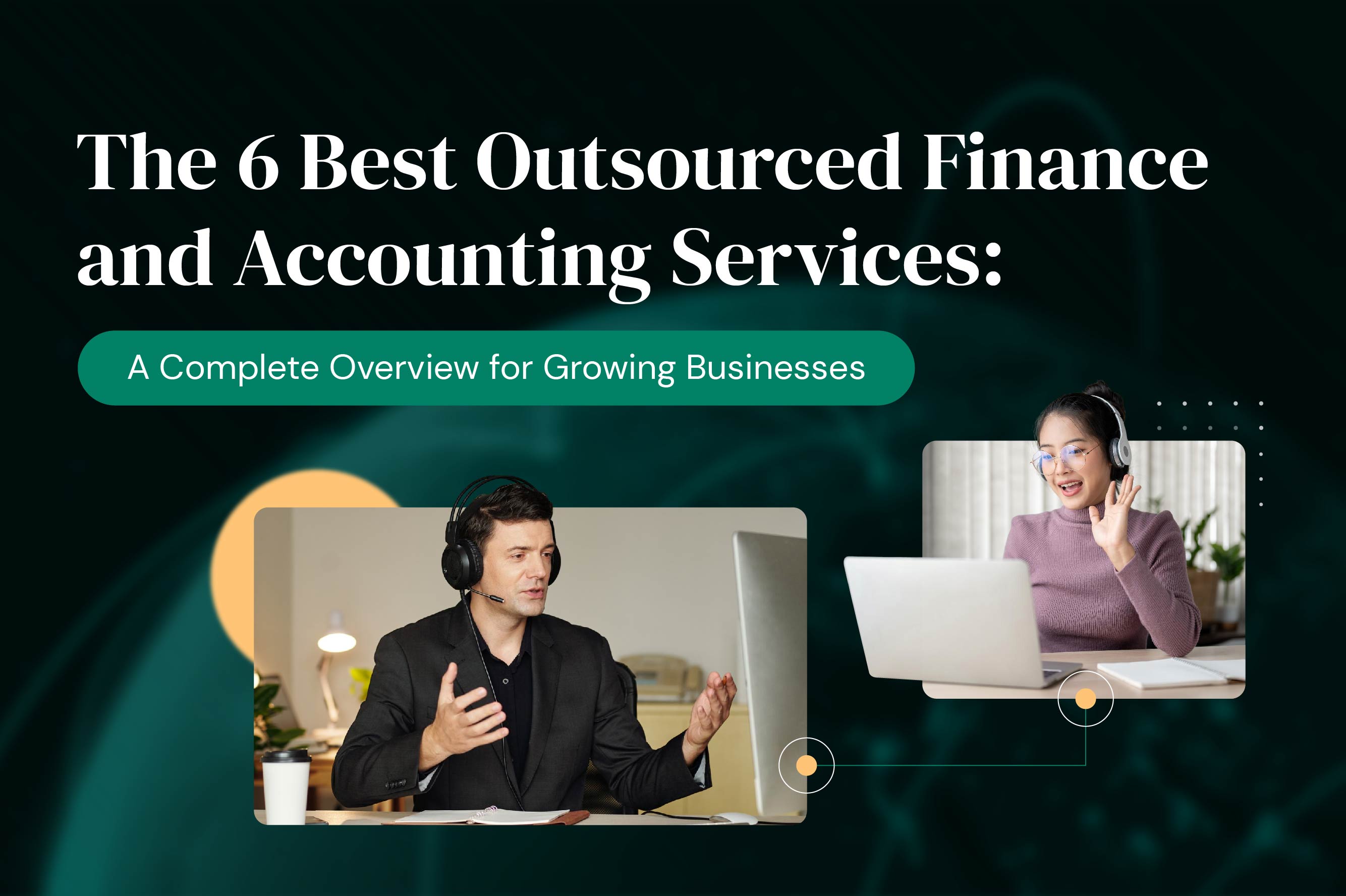Why overspend on local hires when world-class financial expertise is available for a fraction? I've witnessed companies needlessly burn cash on bloated payrolls while highly qualified, experienced Filipino accounting professionals offer superior work at unbeatable rates.
The outsourced finance and accounting market is booming, enabling 60-80% operational savings and access to specialized skills. Yet, this isn't a "set it and forget it" solution; choosing the wrong partner can be more detrimental than doing nothing. Drawing from extensive experience helping businesses in this space, I've distilled the key insights. This guide reveals the best providers, potential pitfalls, and crucial questions to ask.
Top 6 Outsourced Finance and Accounting Services

I've rounded up this list of the best outsourced finance and accounting services:
1. Somewhere
Somewhere is the top choice for outsourced finance and accounting services, and here's why.
We provide exceptional remote talent for finance and accounting roles and mastered the art of connecting businesses with top-tier global talent. If you are looking to hire an accountant, hire a bookkeeper or hire a financial analyst, or are looking for controller services or CFO support, we can help you find the right candidate, often at a significant cost saving compared to US hires.
What truly sets Somewhere apart is our dedication to building a full-service, committed finance team for your business. Our rigorous vetting process ensures you get highly qualified professionals who seamlessly integrate with your existing operations. We don't just fill roles; we build relationships. With a proven track record across multiple industries and the potential for 70-80% cost savings, we've become the go-to choice for businesses aiming to scale efficiently.
2. Bench
Bench leverages proprietary software to handle routine transactions while experienced bookkeepers review and categorize everything, ensuring accuracy and consistency. They provide automated bookkeeping, monthly financial statements, and essential tax preparation support, making them an excellent fit for small businesses with straightforward accounting needs and limited budgets.
3. inDinero
inDinero is designed for companies experiencing rapid growth who need scalable financial support, offering full-service accounting, tax preparation, and fractional CFO services with advanced reporting capabilities. Their team-based approach is a key differentiator: you're assigned a controller who oversees a team of specialists. This, combined with their technology platform, provides real-time insights while human experts handle complex analysis and strategic planning.
4. Maxim Liberty
Maxim Liberty offers a cost-effective solution for fundamental accounting tasks, including bookkeeping, payroll processing, and financial reporting with flexible service levels. Their Canadian-based team provides quality service at rates that are hard to beat, and they don't require long-term contracts, offering great flexibility.
5. Paro
Paro provides on-demand access to highly experienced US-based accounting professionals, making them ideal for businesses needing specialized expertise for particular projects or temporary needs. They offer a unique solution for specific financial challenges rather than ongoing routine work.Paro's network is highly curated, featuring only the top 2% of applicants with an average of 15 years of experience.
6. TOA Global
TOA Global focuses on building dedicated offshore accounting teams from the Philippines for long-term partnerships. Unlike shared service models, TOA Global provides full-time professionals who work exclusively for your business. This fosters stronger relationships, a deeper understanding of your operations, and greater continuity. You gain significant cost savings with offshore talent and benefit from their extensive experience in placing accounting professionals.
Why Outsourcing Your Finance and Accounting Makes Business Sense
Consider an ecommerce company that spent $180,000 annually on two in-house accountants. By switching to an outsourced provider, they now pay $45,000 for a full team, including a senior accountant, bookkeeper, and part-time controller. This represents a 75% cost reduction with improved service quality.
The Real Cost Savings Go Beyond Salaries
Everyone talks about salary savings, but the hidden costs add up fast. When you hire locally, you're paying:
- Base salary plus 20-30% in benefits
- Office space and equipment
- Software licenses for each user
- Training and professional development
- Recruitment and onboarding costs
- Potential turnover and replacement expenses
Outsourced providers absorb these costs and spread them across multiple clients. You get enterprise-level expertise without enterprise-level overhead.
Access to Specialized Skills Without the Premium
Remember when hiring a CPA meant paying $80,000+ annually? Outsourced providers employ teams of specialists: tax experts, financial analysts, compliance officers, that you can tap into as needed. It's like having a finance department on demand.
Technology That Actually Works
Outsourced providers invest heavily in technology because efficiency directly impacts their margins. They're using advanced accounting software, automation tools, and reporting dashboards that most small businesses can't justify purchasing independently.
What to Look for in an Outsourced Finance Provider

Choosing a provider isn't like picking a restaurant based on Yelp reviews. You're handing over your financial data, the lifeblood of your business. Here's what actually matters:
Service Range and Depth
Don't get seduced by providers offering "everything." Look for firms that excel in the services you actually need:
Core Services:
- Monthly bookkeeping and reconciliation
- Accounts payable and receivable management
- Payroll processing and tax compliance
- Financial reporting and analysis
Advanced Services:
- Controller and CFO-level strategic support
- Budget planning and forecasting
- Cash flow management
- Audit preparation and support
Industry Experience Matters More Than You Think
Generic providers might handle your books, but industry specialists understand your unique challenges. A firm experienced with ecommerce knows about inventory accounting complexities. One familiar with professional services understands project-based revenue recognition.
Security and Compliance Standards
This isn't negotiable. Look for providers with:
- SOC 2 Type II certification
- Bank-level encryption for data transmission
- Regular security audits and compliance reviews
- Clear data handling and retention policies
Communication and Reporting Structure
The best providers don't just crunch numbers; they communicate insights. Expect:
- Dedicated account managers
- Regular financial reports with commentary
- Proactive alerts about cash flow or compliance issues
- Scheduled review meetings to discuss performance
How to Choose the Right Provider for Your Business
Selecting a finance and accounting partner isn't a decision you make over lunch. Here's a systematic approach:
Step 1: Audit Your Current Situation
Before talking to any providers, understand what you're spending now. Include:
- Current staff salaries and benefits
- Software and technology costs
- Office space allocation
- Time spent by non-finance staff on financial tasks
Step 2: Define Your Service Requirements
Be specific about what you need:
- Daily transaction processing
- Monthly financial statements
- Quarterly tax filings
- Annual audit support
- Strategic financial planning
Step 3: Evaluate Cultural Fit
This matters more than most people realize. During my time in Manila, I saw partnerships fail not because of skill gaps, but because of communication style mismatches. Look for providers who:
- Communicate proactively
- Ask clarifying questions
- Provide regular updates without being asked
- Understand your business model and industry
Step 4: Test Their Expertise
Don't just take their word for it. Ask specific questions about:
- How they handle your industry's unique accounting challenges
- Their experience with your business size and complexity
- Recent regulatory changes affecting your sector
- Integration with your existing software stack
Step 5: Start Small and Scale
Consider beginning with a limited scope, maybe monthly bookkeeping, before expanding to full-service support. This lets you evaluate their work quality and communication style with limited risk.
Common Misconceptions About Outsourced Finance Services

"I'll Lose Control of My Finances"
This fear can keep you awake during your first outsourcing project. The reality? Good providers increase your visibility into financial operations through better reporting and regular communication. You're not losing control; you're gaining professional oversight.
"Data Security Is Too Risky"
Reputable providers invest more in security than most small businesses can afford. They're handling sensitive data for hundreds of clients, so security breaches would destroy their business. Look for SOC 2 compliance and ask about their security protocols.
"Communication Will Be Impossible"
Time zone differences can actually be an advantage. Your accounting team can process transactions and prepare reports while you sleep, giving you fresh financial data each morning. Most providers offer overlapping hours for real-time communication when needed.
"It's Only Cost-Effective for Large Companies"
The opposite is true. Large companies can afford dedicated finance teams. Small businesses benefit most from outsourcing because they get enterprise-level expertise without enterprise-level costs.
Making the Transition Smooth
Switching to an outsourced provider doesn't have to disrupt your operations. Here's what works best:
Plan for a 30-60 Day Transition
Don't expect immediate perfection. Good providers need time to understand your business, set up systems, and establish workflows. Plan for this learning curve.
Maintain Some Internal Oversight
Even with outsourced services, someone internally should understand your financial position and review reports regularly. This person becomes your liaison with the provider.
Document Everything
Create clear procedures for how transactions should be handled, what reports you need, and when you need them. This prevents misunderstandings and ensures consistency.
What's the Real Payoff Here?
Outsourcing finance and accounting isn't just about cutting costs; it's about accessing expertise that can help your business grow. The companies I've seen succeed with outsourcing share one trait: they chose providers based on fit, not just price.
Whether you're a startup burning through cash or an established business looking to optimize operations, the right outsourced provider can transform your financial management. Start by honestly assessing your needs, then have conversations with providers who specialize in businesses like yours.
The finance function is too important to leave to chance, but it's also too expensive to handle inefficiently. Find the right partner, and you'll wonder why you waited so long to make the switch.
Ready to explore your options? The key is taking that first step toward more efficient, cost-effective financial management.
Use the contact form below to book a call with Somewhere. We'll help you build a high-performing remote finance and accounting team.












.jpeg)

